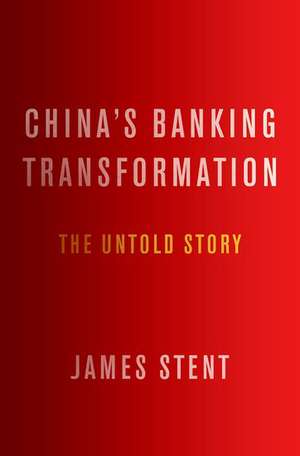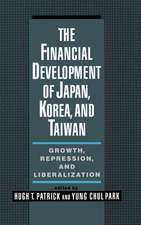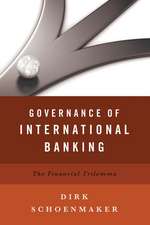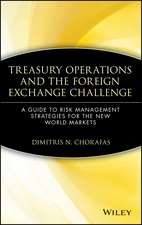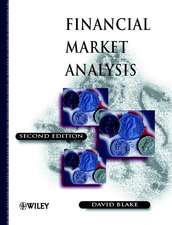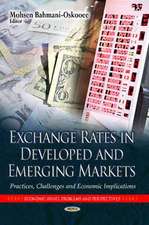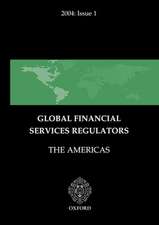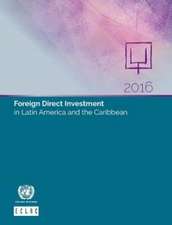China's Banking Transformation: The Untold Story
Autor James Stenten Limba Engleză Hardback – 5 ian 2017
Preț: 313.17 lei
Preț vechi: 354.73 lei
-12% Nou
Puncte Express: 470
Preț estimativ în valută:
59.93€ • 62.19$ • 50.09£
59.93€ • 62.19$ • 50.09£
Carte tipărită la comandă
Livrare economică 04-10 martie
Preluare comenzi: 021 569.72.76
Specificații
ISBN-13: 9780190497033
ISBN-10: 0190497033
Pagini: 304
Dimensiuni: 160 x 236 x 31 mm
Greutate: 0.59 kg
Editura: Oxford University Press
Colecția OUP USA
Locul publicării:New York, United States
ISBN-10: 0190497033
Pagini: 304
Dimensiuni: 160 x 236 x 31 mm
Greutate: 0.59 kg
Editura: Oxford University Press
Colecția OUP USA
Locul publicării:New York, United States
Recenzii
James Stent has produced a study that is unique among the hundreds of books written about China and its economic transformation. He approaches the topic of banking reform in China as a participant in the process and provides distinct insight into Chinese politics and culture as it influences the way China does business. China's Banking Transformation is a remarkable achievement and should be read by both China scholars, those interested in Chinese banking, and also by those searching for a better and broader understanding of China's economic reforms.
James Stent makes a compelling case as to why fears of a Chinese banking crisis are vastly overblown -- very much at odds with the consensus mindset in the West that remains enamored with the dark side of China. His analysis of the Chinese banking system in the context of China's unique hybrid economic model is a must read for those who want to get China right.
This opportune, well-conceived volume can stand as at least a partial corrective to the current wave of negative polemics respecting the presumed behavior of China's economy. Relying on decades of Asian banking experience, including a dozen years in the PRC itself, Stent puts forth a strikingly positive assessment of China's ongoing banking metamorphosis. While his interpretation of Chinese cultural norms is at times hackneyed, Stent forcefully argues that Confucianism as well as the ubiquitous party-state have engendered a distinctive banking system capably serving national development goals as well as financial profits. From mere bursars of state funds under Maoism, China's banks have steadily emerged as modern, well-run commercial institutions functioning within a "market socialist" political economy.
This opportune, well-conceived volume can stand as at least a partial corrective to the current wave of negative polemics respecting the presumed behavior of China's economy. Relying on decades of Asian banking experience, including a dozen years in the PRC itself, Stent puts forth a strikingly positive assessment of China's ongoing banking metamorphosis. Stent relies on his extensive contacts with a wide range of bank personnel to critique ill-informed and often biased Western assessments.
Understanding the wider political and economic context and modus operandi of China's banks should be the first step for engaging with the sector in China.Stent delivers this through his detailed, thorough and comprehensive account of Chinas banking transformation.
James Stent makes a compelling case as to why fears of a Chinese banking crisis are vastly overblown -- very much at odds with the consensus mindset in the West that remains enamored with the dark side of China. His analysis of the Chinese banking system in the context of China's unique hybrid economic model is a must read for those who want to get China right.
This opportune, well-conceived volume can stand as at least a partial corrective to the current wave of negative polemics respecting the presumed behavior of China's economy. Relying on decades of Asian banking experience, including a dozen years in the PRC itself, Stent puts forth a strikingly positive assessment of China's ongoing banking metamorphosis. While his interpretation of Chinese cultural norms is at times hackneyed, Stent forcefully argues that Confucianism as well as the ubiquitous party-state have engendered a distinctive banking system capably serving national development goals as well as financial profits. From mere bursars of state funds under Maoism, China's banks have steadily emerged as modern, well-run commercial institutions functioning within a "market socialist" political economy.
This opportune, well-conceived volume can stand as at least a partial corrective to the current wave of negative polemics respecting the presumed behavior of China's economy. Relying on decades of Asian banking experience, including a dozen years in the PRC itself, Stent puts forth a strikingly positive assessment of China's ongoing banking metamorphosis. Stent relies on his extensive contacts with a wide range of bank personnel to critique ill-informed and often biased Western assessments.
Understanding the wider political and economic context and modus operandi of China's banks should be the first step for engaging with the sector in China.Stent delivers this through his detailed, thorough and comprehensive account of Chinas banking transformation.
Notă biografică
James Stent served for 12 years on the boards of China Minsheng Bank and China Everbright Bank in Beijing, and is presently on the boards of banks in Mongolia and Myanmar. Altogether, he has been engaged in commercial banking in Asia for more than four decades, starting with Citibank and Crocker National Bank in the Philippines, Hong Kong, and Thailand, prior to joining the management of a Thai bank in Bangkok. Stent now divides his time between residences in Bangkok and California. Fluent in Chinese and Thai, he studied economic development at the Woodrow Wilson School at Princeton University.
